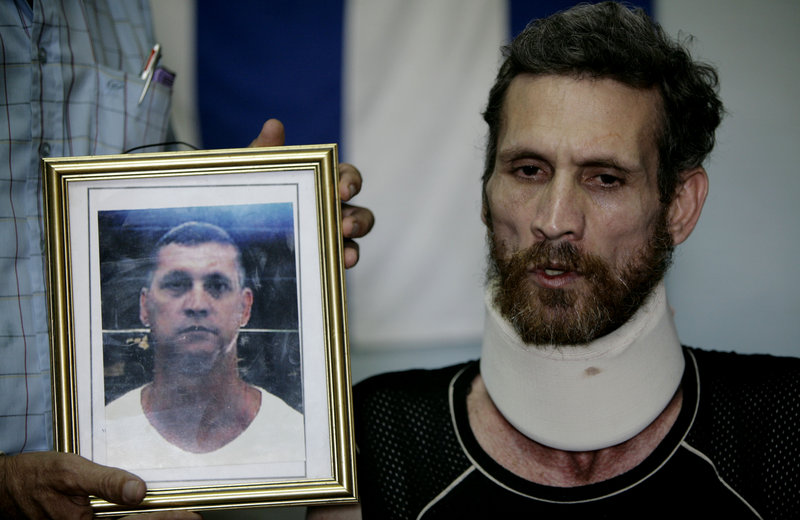PEDRO BETANCOURT, Cuba — Cuba on Saturday freed a political prisoner who is confined to a wheelchair and began transferring six others to jails closer to their homes, part of a deal with the Roman Catholic Church and the most important sign yet that the government may be softening its hard-line stance on organized dissent.
Ariel Sigler, one of 75 activists, community organizers and journalists arrested in a sweeping 2003 crackdown, was released in his hometown of Pedro Betancourt in the province of Matanzas.
“I feel a mix of happiness and sadness,” Sigler told a small group of reporters in the town, about 160 miles east of Havana, Cuba’s capital.
“I’m sad because I can’t share this moment with my mother who died five months ago,” he added, “and because more than half of our companions are still in prison.”
Sigler, 44, had been serving a 25-year sentence for treason until being transferred recently to a hospital. He arrived at his home in a Ministry of the Interior ambulance.
With the prisoner’s release, 52 of those arrested in March 2003 remain behind bars. The others have been freed on medical parole, forced into exile or completed their sentences.
Six other prisoners from the so-called “Group of 75” — Hector Fernando Maceda, Juan Adolfo Fernandez, Omar Moises Ruiz, Efren Fernandez, Jesus Mustafa Felipe and Juan Carlos Herrera — were being moved to jails closer to their homes, bringing to 12 the number of imprisoned dissidents sent to new facilities this month.
“They were taken from their cells early,” Elizardo Sanchez, who heads the Havana-based Cuban Commission on Human Rights and National Reconciliation, said by phone Saturday.
Sanchez’s group puts the total number of political prisoners held in Cuba at 180, although that list includes some who were convicted of violent acts.
The Group of 75 was arrested when the world’s attention was focused on the start of the U.S.-led war in Iraq.
The human rights situation has remained tense since late February when another jailed dissident, Juan Zapato Tamayo, died following a lengthy hunger strike, sparking international condemnation. Sanchez said freeing Sigler and transferring the others may be part of a larger governmental effort to rehabilitate its reputation.
“I get the impression that Cuba is now working on generating a media image,” he said.
Saturday’s government actions followed negotiations between the government of President Raul Castro and the office of Havana Cardinal Jaime Ortega. They come just days before a visit to Cuba by the Vatican’s foreign minister, Archbishop Dominique Mamberti. Cuba’s government has not commented on any prison transfers.
Opposition and church leaders had expressed hope the communist government might make more concessions ahead of the trip, the first to Cuba by a top Vatican official since 2008.
Send questions/comments to the editors.



Success. Please wait for the page to reload. If the page does not reload within 5 seconds, please refresh the page.
Enter your email and password to access comments.
Hi, to comment on stories you must . This profile is in addition to your subscription and website login.
Already have a commenting profile? .
Invalid username/password.
Please check your email to confirm and complete your registration.
Only subscribers are eligible to post comments. Please subscribe or login first for digital access. Here’s why.
Use the form below to reset your password. When you've submitted your account email, we will send an email with a reset code.